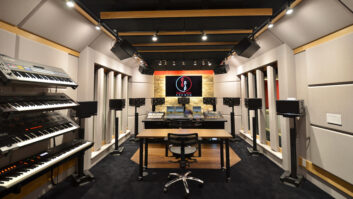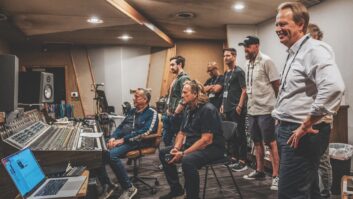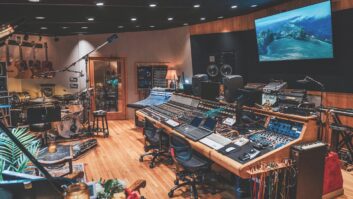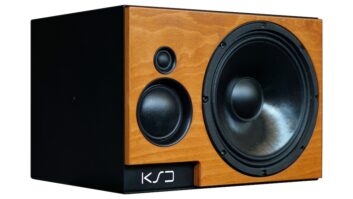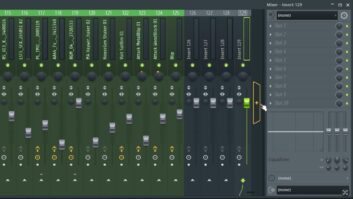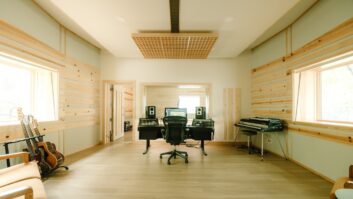
Los Angeles, CA (April 5, 2021)—About six years ago, disillusioned with the quality of rehearsal spaces where they lived in Bristol, England, David Borrie and Mikey Hammerton designed and built their own studio. Fast forward to today and Pirate, the resulting company they co-founded, has begun making inroads into the North American market after opening recording, podcast, DJ, dance and rehearsal facilities across the U.K., Ireland and Germany.
“We had one site in the U.S. three years ago, a proof of concept with three studios. These days, we have 20 to 30 studios per site,” says another co-founder, Bristol native Sammi Alani, who has relocated to Los Angeles to direct Pirate’s expansion into the U.S. and Canada.
“Without COVID, we’d probably be in 10 U.S. cities by now. The plan is to be in every U.S. city with a population of at least 500,000 within the next three years. That will be around 4,000 studios in North America.”
Eventually, he says, “We want to build 10,000 studios globally by mid-2024.”
Pirate initially opened three complexes in New York City, in Gowanus and Bushwick in Brooklyn and in Ridgewood, Queens. In late February, the company launched facilities in L.A.’s Silver Lake and West Adams neighborhoods.
The mix of rooms at each location is data driven. “That’s down to the algorithms, tests and regression analyses,” says Alani. West Adams, for instance, has only three rehearsal spaces but 13 recording studios, eight DJ rooms and two podcast recording suites. For the moment, only U.K. locations include dance studios. In a market like L.A., he says, the recording spaces could potentially also attract voiceover artists, scoring composers and the like.
The recording studios, some with a vocal booth, are equipped with the essentials; clients just bring their laptops. Gear varies between locations, but can include KRK, Yamaha or Focal monitors, a Focusrite interface, Pioneer headphones, sE Electronics microphones and Novation controllers. A monitor display, mic stands and other accessories are included. Podcast studios feature a RØDECaster Pro, four Røde mics and KRK headphones. The DJ rooms exclusively use Pioneer decks and speakers.
Pirate’s equipment purchases initially went via distributor Rose Morris in the U.K. “As we got more savvy and got into the U.S. market, we realized we could get better deals going direct. We have a product team; a couple of those people have equipment expertise. Negotiations are done through our operations team,” says Alani.
How One College is Holding Real-Time Remote Rehearsals
For equipment manufacturers, he says, Pirate offers an opportunity for real-world gear testing, not to mention marketing. “Hundreds of musicians are coming through and trying the gear,” he says.
Room rates are very economical, starting at $10 an hour, thanks to a low overhead—everything is self-service. Clients register and book online, receiving a code for keyless entry. Locations are unattended and open 24/7, which has been an advantage during the pandemic, he says. The company offers thousands of free hours at the launch of each location and also makes studio time freely available to neighborhood charities.
That said, there is a staff. “We have cleaners who come in every day, and we have site techs. Each site gets a four-hour visit, where they check all the equipment,” Alani says. “We’re quite a techie business. We’ve got a lot of data and are able to predict when a piece of kit is going to go down.”
In the immediate term, he says, “We’re expanding in L.A. because there’s such a demand. As soon as things start up again, we’re going to Chicago, Austin, Dallas and Houston.” A push into Canada is on the cards for 2022.
Longer term, Pirate intends to further build on its creative community, leveraging high-speed internet access at its locations. Soon, artists will be able to record themselves to the cloud, no strings attached. Next will come live streaming, says Alani, through a Pirate app to social media platforms. That will enable digital gigs, and some rooms may be outfitted with green screens.
Ultimately, Pirate will offer a global marketplace, where artists can sell their services remotely, whether that’s collaborations, teaching or other ventures. “The opportunities are endless,” he says.
Pirate • www.pirate.com
